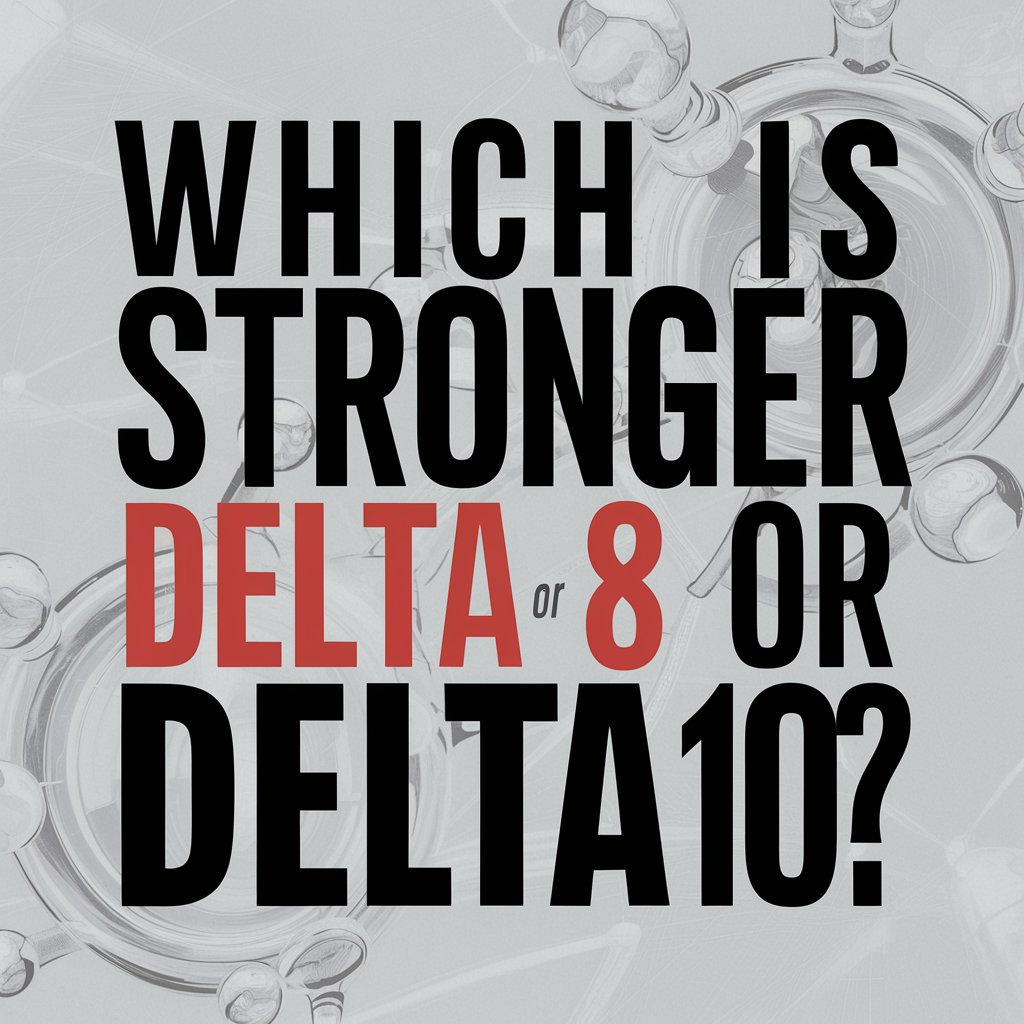Which Is Stronger, Delta 8 Or Delta 10: Let’s Know The Difference
Delta 8 and Delta 10 are promising compounds with unique properties and potential benefits. While both belong to the THC family, their structural differences lead to differing effects on the human body. Delta 8, a minor cannabinoid derived from hemp, is known for its mild psychoactive effects, offering consumers a more balanced and mellow experience compared to its more potent counterpart, Delta 9.
On the other hand, Delta 10, a lesser-known cannabinoid, has garnered attention for its supposed uplifting and energizing effects, potentially providing users with a stimulating experience without inducing anxiety or paranoia commonly associated with Delta 9.
However, the debate over which cannabinoid is stronger remains subjective and multifaceted. For instance, Delta 10 is generally considered more robust than Delta 8, offering a more potent psychoactive effect. However, individual experiences may vary depending on dosage and personal tolerance.
Reading this article to understand the differences between Delta 8 and Delta 10 is essential. This will allow you to make informed choices tailored to your preferences and needs.
Introduction: The Rise of Delta 8 and Delta 10
In recent times, Delta 8 and Delta 10, two types of cannabinoids found in cannabis, have become more popular. They’re similar to the famous THC but have their effects. Delta 8 gives a milder high than regular THC, making it attractive to some users. Delta 10 is still being studied, but people are interested in its possible benefits.
The rise of Delta 8 and Delta 10 has made many people curious, leading to more research and discussion. People want to know more about their effects and how they can be used. As interest grows, it’s essential to learn more about these cannabinoids to understand how they might be helpful for both medical and recreational cannabis users.
What Exactly Are Delta 8 and Delta 10?
Before getting into their disparities, it’s imperative to grasp the fundamentals of Delta 8 and Delta 10. Both compounds are analogs of THCA flower (tetrahydrocannabinol), the primary psychoactive component of cannabis. However, their molecular structures differ slightly, leading to variations in their effects on the body.
Delta 8 THC is a minor cannabinoid found in trace amounts in cannabis plants. It is created through the degradation of Delta 9 THC, the most abundant cannabinoid and the one responsible for the plant’s psychoactive effects.
On the other hand, Delta 10 THC is a more recent discovery and is derived from hemp. Its existence was not widely known until recent advancements in extraction and analytical techniques uncovered its presence.
Is Delta 8 or Delta 10 Stronger?
One of the most prominent points of contention when comparing Delta 8 and Delta 10 is their potency. Potency refers to the strength or effectiveness of a substance, particularly in producing physiological or psychological effects. Determining which cannabinoids are more vital involves assessing various factors, including their binding affinity to cannabinoid receptors, psychoactive effects, and therapeutic potential.
Delta 8 THC
Delta 8 THC is renowned for its mild psychoactive effects compared to its Delta 9 counterpart. It interacts primarily with the CB1 receptors in the endocannabinoid system, albeit with a lower affinity than Delta 9 THC.
As a result, consumers often report experiencing a more subtle high characterized by relaxation and euphoria, coupled with less anxiety and paranoia. This milder psychoactivity makes Delta 8 THCA flower appealing to individuals seeking therapeutic benefits without the intense intoxication associated with Delta 9 THC.
In terms of potency, Delta 8 THC is considered to be moderately potent. While it may not induce the same level of intoxication as Delta 9 THC, its effects are noticeable and can vary depending on factors such as dosage and individual tolerance. Moreover, Delta 8 THC exhibits promising therapeutic potential, with preliminary research suggesting anti-nausea, anti-anxiety, and pain-relieving properties.
Delta 10 THC
Delta 10 THC, being a relatively new addition to the cannabinoid family, has sparked curiosity regarding its potency and effects unlike Delta 8 THC, which is primarily derived from the degradation of Delta 9 THC, Delta 10 THC is synthesized from hemp-derived CBD (cannabidiol) through a process known as isomerization.
The potency of Delta 10 THC is still being elucidated, with limited research available to draw definitive conclusions. However, anecdotal reports suggest that it may possess psychoactive effects similar to Delta 9 THC, albeit with some distinctions. Some users claim that Delta 10 THC induces a more uplifting and energizing high, with fewer sedative effects compared to Delta 9 THC. This unique profile has garnered interest among cannabis enthusiasts seeking alternative experiences.
Are Delta-10 THC And Delta-8 THC Legal?
Compounds like delta-10 THC and delta-8 THC, both Tetrahydrocannabinol, are prohibited under federal law by the Drug Enforcement Administration if derived from cannabis. According to the Federal Analog Act, substances closely resembling Schedule I drugs are also categorized as Schedule I and thus illegal. Given their chemical similarity to delta-9 THC, a Schedule I substance, delta-10 THC and delta-8 THC are considered illegal in states where delta-9 THC is banned.
Furthermore, the FDA has issued cautionary letters to companies marketing delta-8 THC products, citing concerns that their appearance, such as resembling traditional snacks, could lead to confusion.
Despite varying state laws on medical and recreational cannabis use, federal law maintains its prohibition. Individuals considering cannabis consumption should research their state’s regulations beforehand.
Conclusion: Difference Between Delta 8 And Delta 9
In the ongoing debate over the potency of Delta 8 and Delta 10, it becomes evident that both cannabinoids offer distinct experiences and potential benefits. While Delta 8 THC boasts a reputation for its milder psychoactive effects and therapeutic potential, Delta 10 THC presents a novel option with unique characteristics that appeal to a diverse audience.
As research into these cannabinoids progresses, our understanding of their potency and effects will evolve. Ultimately, the choice between Delta 8 and Delta 10 refers to individual preferences and desired outcomes. Whether seeking relaxation, euphoria, or therapeutic relief, consumers can now navigate the cannabinoid landscape armed with knowledge of the disparities between Delta 8 and Delta 10.






